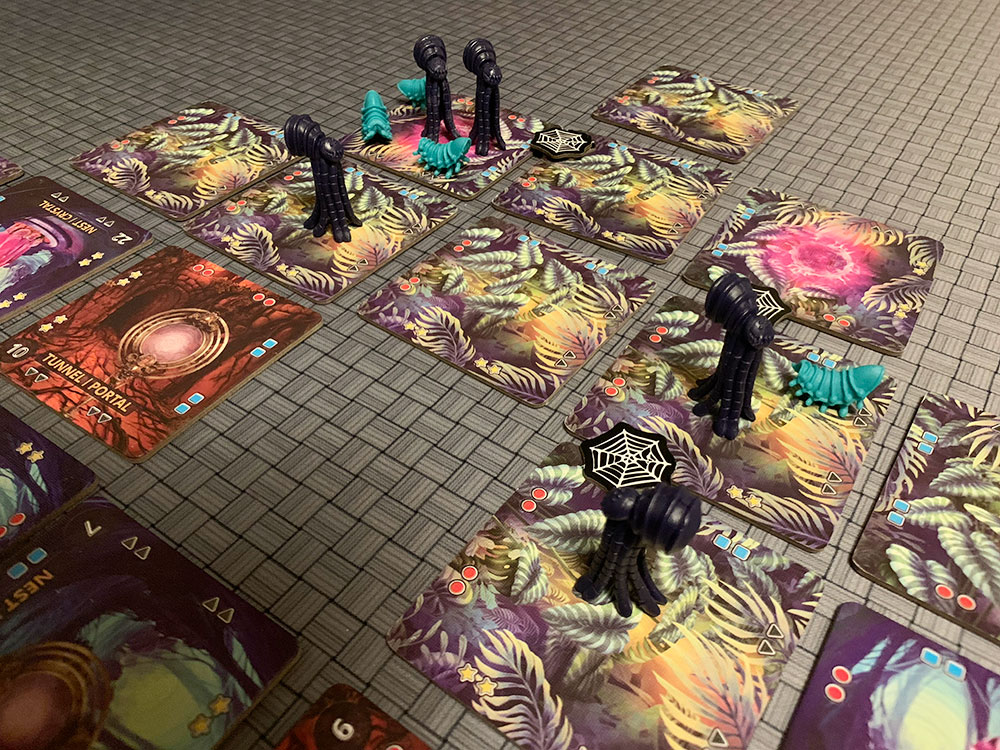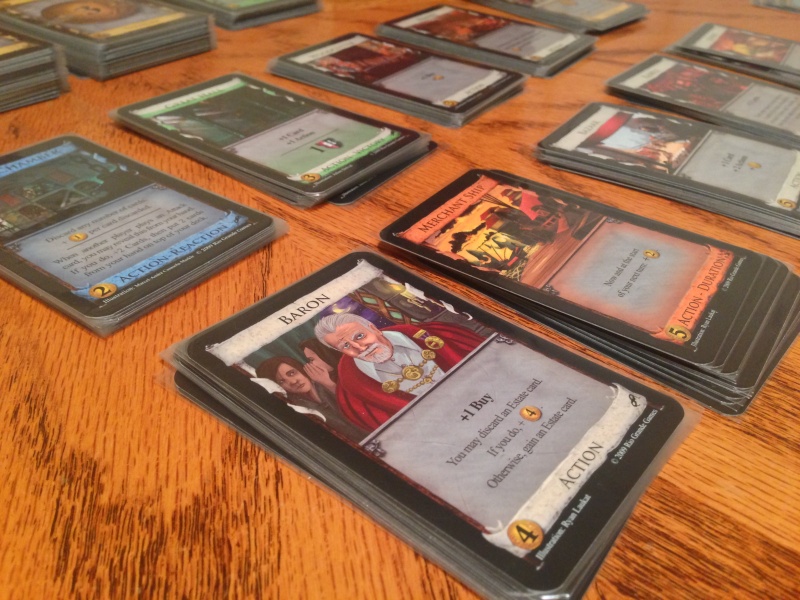 Eight or nine years ago I wanted to find an alternative to sitting on the couch with my wife and do something together in the evenings. I had grown up playing a lot of board games and RPGs and had been intrigued by a lot of the games I saw at stores like Barnes and Nobles and Borders. One of the first ones I picked up was Forbidden Island which we both really enjoyed. A year or so later she gave me Forbidden Desert for my birthday, which to this day is still one of my favorite cooperative games.
Eight or nine years ago I wanted to find an alternative to sitting on the couch with my wife and do something together in the evenings. I had grown up playing a lot of board games and RPGs and had been intrigued by a lot of the games I saw at stores like Barnes and Nobles and Borders. One of the first ones I picked up was Forbidden Island which we both really enjoyed. A year or so later she gave me Forbidden Desert for my birthday, which to this day is still one of my favorite cooperative games.
While I was shocked and blown away in all the worst ways by Forbidden Sky (read as: it crashed and burned for me) I was excited with the news of a fourth in the series and so was extremely excited when Tony asked if I wanted to review it.
Does Forbidden Jungle return to former glory or is the forbidden series batting 500 now?
Gameplay Overview:
One of the biggest differences is the set up where there’s variability beyond the normal randomization of tiles as you get to pick one of seven different layouts of varying difficulty. Like the other Forbidden games, you randomly select a character card with a unique power to play with their corresponding pawn.
The goal of the game is to explore four illuminated crystals and get them orthogonally adjacent to a portal that is devoid of alien critters to escape the jungle.

Each player gets to take up to four of the actions described below:
• Move orthogonally to an adjacent tile that isn’t blocked by spider webs.
• Remove one web, egg, hatchling, or adult aliens
• Explore flips the tile you’re on. This allows you to use the machines on them and gather gear cards. It also exposes important keywords like nest, tunnel, portals, crystals, and electrifiers which are the giant bug zapper you picture it is.
• Operate a Machine using the machine on the tile. The four machines are Portals, Compeller, destruct switches, and configurators. A portal is needed to win the game while the compellers move all hatchlings and adults one space. The destruct switch allows you to remove a tile from the game (with all its creepy crawly occupants) and the configurator allows you to slide a tile into an open space like a slide puzzle that also breaks all webs connecting it to its previous neighbors.
Much like the other Forbidden games, at the conclusion of your turn you draw threat cards equal to the number on the threat track. This does things like raise the threat level, spawn webs, eggs, hatchlings, or adults. Other cards move hatchlings or adults in a specific direction (indicated by symbols on each side of the tiles) while others allow things to grow. When the adults move they sting characters in their ending space which knocks down your health. There’s also one card that destroys the lowest visible number tile.
The game continues until one player is knocked out, the threat gets too high, you run out of critters to place on the board, or you can’t activate the portal.

Game Experience:
Forbidden Jungle is both comfortable in reusing many familiar mechanisms while also offering something new to the series. There are aspects of Island (shrinking play area), Desert (exploring the tiles and managing aliens felt analogous to sand management), and sky (configuring the board is like building a circuit). The new twist is manipulating the board with the configurators and destruct switches which reminds me of the old slide puzzles and brute forcing slide puzzles with a hammer, respectively.
It took a few plays to realize that you almost want to do the minimum amount of exploration as the keywords are often as hurtful as they are helpful. Having tunnels to move around (like Desert) is great until they all get eggs or hatchlings added to them.

On the counter side less is more for exploring; getting gear is pretty awesome and they provide additional tools for dealing with your friends’ luck at drawing the worst threat cards each turn. Directing a bunch of enemies onto a tile and then destroying it is satisfying but that destruction also inches one step closer to a threat card eliminating some other important tile.
Luck plays a factor both in how fast you uncover critical elements and in draws from the threat deck. I’ve drawn spawn eggs, hatch eggs, and grow hatchlings into adults in the same turn. If that order was reversed, maybe it wouldn’t be so bad, but as it was we lost the game due to running out of miniatures.
Outside of that rare outcome, I’ve generally felt that when I lost, I could still pinpoint at least one or two poor choices that let things get out of hand much like in Island and Desert. Sky had the unfortunate mechanic that if your friends drew cards poorly you’d get blown off the platform and electrocuted like Toad in the original X-Men film making the game significantly more difficult at higher player counts. And while that could still happen here, there’s only one health track to monitor and three players didn’t seem harder than two players (I haven’t played it at four or five players yet).
I’m under .500 in the game so far and I’ve never been close to maxing out the threat track in my two and three-player games (granted, I’m still playing Care Bear/Novice mode with the starting setup). I have run out of webs and miniatures and health as I got stung to death on my way to cleverly destroy a bunch of aliens.

As a reviewer, I try to find things to criticize, not to pick on games or designers but to highlight things that may not work for some people to help them make an educated decision. And here, besides luck, I only have a few very minor quibbles. Some of the tall aliens are prone to fall over—this was addressed with some hot water and spreading their tentacles out. But that also leads into my second minor complaint—the tiles can get messy with the aliens, hatchlings, eggs, and webs covering the symbols used for directions and making it hard for my clumsy hands to move my pawn without knocking everything else around. Additionally, the clutter can obstruct the symbols that indicate directions.
There are more pieces involved in Forbidden Jungle than the other Forbidden games and you must be deliberate with how you go through the board spawning, growing, or moving enemies. This isn’t a complaint but more of a heads up for people, especially as these tend to be gateway friendly. If someone is brand new to the hobby, I wouldn’t start with Jungle due to the fiddliness when compared to the other games in this series. But if they’re already saving and/or buying little plastic bags for organizing components, then they’ll be fine and they’ll be happy to see the game comes very well organized in the tin. And I’m glad they went back to the tin not because I like tins (I don’t) but because it goes well with the others in the series.
Final Thoughts:
I really, really like Forbidden Jungle. It doesn’t surpass Forbidden Desert for me yet. Based on the number of plays I have on the first two entries in this series (over 60 combined) I feel like this is a solid addition to the series. If you don’t like this series for being too simple, this one is slightly more complex so it may be worth giving a try. My biggest complaint is bad luck can wreck you but it’s not as punishing as Forbidden Sky. However, that’s not stopping me from keeping this with both Forbidden Island and Forbidden Desert as great cooperative games that can be played with almost anyone.
Final Score: 4 Stars – Forbidden Jungle is a fantastic addition to the Forbidden Series that feels simultaneously familiar and fresh.
 Hits:
Hits:
• Slide puzzle mechanic is fun
• Lots of solutions to on-going problems in-game
• Variable set up
Misses:
• Luck plays a large factor in the difficulty
• Tiles can get a little cluttered with webs and miniatures






















